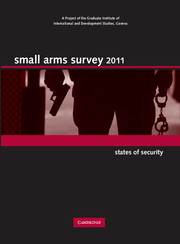Book contents
- Frontmatter
- Foreword
- Contents
- About the Small Arms Survey
- Notes to readers
- Acknowledgements
- Introduction
- Chapter 1 Larger but Less Known: Authorized Light Weapons Transfers
- Chapter 2 Fact or Fiction?: The UN Small Arms Process
- Chapter 3 Procurement and Policy: Police Use of Emerging Weapons Technology
- Chapter 4 A Booming Business: Private Security and Small Arms
- Chapter 5 Protected but Exposed: Multinationals and Private Security
- Chapter 6 Ethos of Exploitation: Insecurity and Predation in Madagascar
- Chapter 7 Reforming the Ranks: Public Security in a Divided Côte d'Ivoire
- Chapter 8 Securing the State: Haiti before and after the Earthquake
- Chapter 9 Balancing Act: Regulation of Civilian Firearm Possession
- Index
Chapter 4 - A Booming Business: Private Security and Small Arms
Published online by Cambridge University Press: 05 March 2012
- Frontmatter
- Foreword
- Contents
- About the Small Arms Survey
- Notes to readers
- Acknowledgements
- Introduction
- Chapter 1 Larger but Less Known: Authorized Light Weapons Transfers
- Chapter 2 Fact or Fiction?: The UN Small Arms Process
- Chapter 3 Procurement and Policy: Police Use of Emerging Weapons Technology
- Chapter 4 A Booming Business: Private Security and Small Arms
- Chapter 5 Protected but Exposed: Multinationals and Private Security
- Chapter 6 Ethos of Exploitation: Insecurity and Predation in Madagascar
- Chapter 7 Reforming the Ranks: Public Security in a Divided Côte d'Ivoire
- Chapter 8 Securing the State: Haiti before and after the Earthquake
- Chapter 9 Balancing Act: Regulation of Civilian Firearm Possession
- Index
Summary
INTRODUCTION
In August 2010, President Hamid Karzai issued a decree requiring private security companies (PSCs) to cease all operations in Afghanistan by December 2010, calling them unwelcome ‘parallel structures’ and a ‘cause for insecurity’ (Afghanistan, 2010; Rubin, 2010). With billions of dollars in Afghan-based development programmes that require constant protection, donor governments reacted by placing intense pressure on Karzai to withdraw the decree. The deadline was ultimately extended, and some PSCs were exempted from the ban, but the president stood by his decision. The case illustrates how deeply embedded PSCs have become in some contexts.
PSCs have come under increased international scrutiny in the 2000s due to the central roles they have been granted in the conflicts of Afghanistan and Iraq, as well as concerns over the perceived lack of accountability for action taken by private personnel. Incidents such as the killing of 17 civilians by Blackwater personnel in September 2007 in Nisoor Square, Baghdad, have significantly tarnished the industry's image (Glanz and Lehren, 2010).
The highly publicized involvement of international PSCs in contemporary conflicts tends to overshadow the much wider trend of security privatization across society as a whole, particularly in non-conflict settings. Around the globe, individuals, communities, local businesses, government agencies, large corporations, and powerful militaries are increasingly outsourcing aspects of their security to private entities.
- Type
- Chapter
- Information
- Small Arms Survey 2011States of Security, pp. 101 - 134Publisher: Cambridge University PressPrint publication year: 2011
- 2
- Cited by



